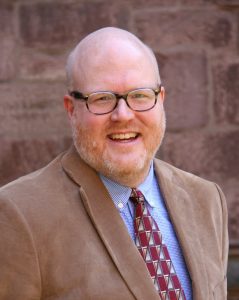
Dr. Brian Rapske (PhD ) serves as Professor of New Testament with Northwest Baptist Seminary and ACTS Seminary. Dr. Rapske’s experience with CBTE programs includes his involvement in shaping NBS’ Immerse program and he has served as an Academic Mentor in that program since its launch in 2012. Dr. Rapske has seen several of his Immerse students graduate and witnessed them step into ministry following their education.
You work with Immerse students, but you also teach in the traditional seminary model as well. How does your thinking change between the two models?
To step into a “mastery for ministry” modality of education calls for a significant difference in how I operate as an educator. It’s quite a culture shift for a person who is well accustomed and formed to seminary theological education. In particular, your access to the student and the modalities of evaluation and assessment are quite different.
Some of the change is adapting the educational culture of the institution.
With this type of program, you can’t think in terms of the classroom and feel as though you’re going to be adequate to the task of mentoring for mastery because the classroom is just too confined and is too narrow for the vision of what is actually supposed to be underway in the educational experience where you’re involved in mentoring people for mastery.
So, for example, I am a New Testament specialist. In my Seminary environment, I teach in New Testament and branch a little bit into hermeneutics and New Testament theology. But in the context of Immerse, I have to be a generalist. My responsibility is far broader than my specialization educationally and that stretches me.
There is also the matter of academy and the pragmatics of ministry. Within the seminary context, you may not necessarily have that overt and engaged ministry focus. In the classroom, we deal more with subject matter. A student submits an assignment, it gets graded and commented a grade is given and then the student is off to the next thing. But within the context of Immerse, everything relates to ministry practice and integrity in ministry. The student engages the project, but then you talk about that project in a forum along with other mentors in a manner similar to an oral examination. Because the assignment may actually have emerged out of a very pragmatic context, we have the opportunity to debrief with the student. That’s just not a luxury that you have within a seminary context where the learning and the application of learning are not engaged in proximity.
With my classroom context, when you come to the end of the semester you say goodbye to your students and you may see them next semester or you may see them in a different context or a different course. But you never really say goodbye to an Immerse student, in fact, you may actually keep up a relationship with them for an extended period of time well past the education.
What kind of opportunities draw you to be involved as an academician in a CBTE program?
The opportunity to have a deeper interaction with the student and be involved in mentoring is wonderful. This is truly mentoring where you’re actually interacting with a person and they have the opportunity to open up about what they are struggling with. Typically, during the 3-5 years it takes to complete a program like this, a student has ups and downs in their ministry. You don’t get access to that unless somebody is very transparent outside of a classroom context. And that’s an amazing place to be – to be able to listen and to offer thoughts and ideas.
It’s stretching because it does call for more than simply my expertise in my area of discipline. I draw on my past pastoral experience, on my many years of lay ministry and other experience. Obviously, I draw on this framing a normal class in an academic setting as well, but there is a very significant element that goes beyond what I normally have the opportunity to do. And I have the opportunity to draw on this, not only in the lecture but in life. I’m not only being asked to share my life, it’s expected and it’s a big opportunity.
I think earlier we thought in terms of what we were losing and that was the hard part in forming the program. We were aware that, as a faculty, we would have to surrender control of the full academic sequence. I only have a few contact hours in a seminar with the students I don’t mentor as opposed to having them for a full semester. And sometimes in Immerse, I get 3-page assignments on occasion and that seems a little light.
But I’ve learned to realize that cumulatively, holistically, integratively, the program is really actually pushing people to get a very thorough education and to do so with immediate ministry requirements and ministry payoffs. We don’t just talk rocketry, so to speak, we talk about it and then we take what we have talked about and we put it on a platform and we light it and we see how it goes. And if it blows up, we go back to the drawing board. Even if it flies, we can analyze the telemetry and do some fine tuning here so that the next ministry opportunity (which will come in a multi-year education) will be even more refined. You don’t get that opportunity within a classroom setting. Oftentimes, that kind of application will have to wait for a number of years. So rather than foreclosing that as an option of learning, you’re always in the field as well as in the classroom. I think that’s amazing. Sometimes the temptation is only to look at the downside, the loss of control, and not look on the positive side of the ledger that says these are the amazing things – opportunities that actually don’t even present themselves because of the way a formal academic setting is structured.
The program curriculum was designed in partnership between the seminary and the denomination. How was forming curriculum for this program different than what you are used to for a classroom context?
I loved being able to be a part of framing the competency entitled “Hope.” In it, our students don’t just read books about the hope of the gospel. They ask the question, “How can I be a person of hope in a world that’s filled with hopelessness?” We get to assign them a project to shadow their pastor as they go on a bereavement call and as they involve themselves by bringing comfort and encouragement from the Scriptures and through their own personal experience in the context of a profound loss that’s shattered people. What kind of classroom experience can replicate that? Not only that but on the third time they go out, they have an opportunity to actually speak into the lives of people.
A lot of us involved in the program recognize that the only time we ever got this from our classic education was long after seminary was done. When we set out there was no sense that we even had of the tools to engage in those situations. We just got thrown into the deep end of the pool and told to swim in our first ministries. I had to do these calls by myself, I had no mentoring, I had no experience. So you can see this has a huge payoff when the projects are actually tuned to the specifics of ministry. They are both an education and an opportunity for ministry at the same time. It builds muscle, it builds spiritual strength and it helps students to put into practice the things that have been read in a book, Surprised by Hope. I think that there are gains. So I’m enthusiastic.
There are different ways of arranging the mentoring in a CBTE program, but Immerse uses a team of three members. You talked about the partnership of the local church, the denomination and the seminary and that partnership is built right into the mentor team with representatives from each. What is that dynamic like, being one of three guiding a student together?
One thing is it creates a deep investment – not only from the seminary but also from the church. There’s a vested interest in educating for success because if it’s a good education, it is going to be a great ministry and if it’s a great ministry, it’s going to be a strong church
I love being on a mentor team with local pastors. That puts me in the church, in several churches actually, and it creates marvelous opportunities to have an impact far beyond the classroom.
You’re hearing from pastoral staff on the ground with your student because they’re on your mentor team and they’re saying if it’s going well or if there are some challenges. And we can discuss how we engage the student in order to make it a learning experience that is going to benefit and advance them in their in their personal growth as well as in their ministry effectiveness.
As far as team mentoring goes, it is so good to know that there are three people that are looking out for one. There are disadvantages in just being one evaluator or in being one of many people who are siloed and not knowing what’s on the other side. How do you ever know that a person is thoroughly furnished unless you have ways and metrics of looking over the silo? And maybe seeing into one or two other silos? Immerse is de-siloed in a number of very significant ways because the church is watching, the on-site mentor is watching, the academic mentor is watching, and the denominational mentor is watching. We have opportunity to see the whole of the student – and where we do not witness directly, we receive the input of the other mentor who do.
What is one story that highlights what is possible in a CBTE program?
One of the assignments is to go on a reflection retreat. As my first student [Glory] approached that assignment she decided to arrange a trip with a friend of hers to the Holy Land and she was going to share some of their reflections via recordings and upload them to our online platform. They had a tour guide that they had arranged. They witnessed to that tour guide. And one of the things that was part of their presentation of these video reflections was to watch Glory baptize the tour guide in the Jordan River!
Watching this I was thinking, “Oh my goodness! How do I grade this?” I was watching ministry live and I just realized that this never happens in a classroom. It’s treasure. Absolutely treasure.
To get to the place where a person does that. And it’s not contrived, it’s not theoretical. A life was changed. Somebody heard the Gospel, somebody responded to the Gospel, somebody was baptized in witness of the fact that they believe. This is not my normal understanding of how a seminary works. And praise God it’s not. It’s more. It’s great.
What I have seen is that over the four years you watch people go through very sad times. And you watch them go through exhilarating times. You see the high-water marks, the very low parts – both in their personal life and their ministry. But as a mentor, you see your student engaged in real ministry. As a mentor I am able to put my finger on their pulse for their energy in ministry and put my finger on their heart. I listen when they are euphoric and I listen when they’re discouraged and I jump in with them. They experience it. But they don’t experience it alone.
We have times when we meet for coffee and other times that it is more remote and somewhat more formal and less personal, but there are some things that seminary education in the classic way just won’t be able to touch. To me, that is what makes it worthwhile. That is what makes it exciting and keeps me going.

 Kent Anderson & Ruth McGillvray: Competency-based theological education (CBTE) is an educational approach that bases program and curricular design on demonstrating mastery of the competencies required to be successful in a targeted vocation or ministry role. People sometimes call CBTE programs “reverse-engineered” because program design starts with the desired end result—as defined by practitioners and employers—and works backward from there.
Kent Anderson & Ruth McGillvray: Competency-based theological education (CBTE) is an educational approach that bases program and curricular design on demonstrating mastery of the competencies required to be successful in a targeted vocation or ministry role. People sometimes call CBTE programs “reverse-engineered” because program design starts with the desired end result—as defined by practitioners and employers—and works backward from there.

 The age of educational institutions having a monopoly on knowledge is quickly ending. Today, videos, lectures and other resources from world-class subject matter experts and communicators are available for free at the click of a button. No matter what subject you are looking for and no matter what depth you are looking to engage it in, you can find the resources you need online. In essence, a motivated learner can access content whenever they want from wherever they have an internet connection. No expensive tuition required.
The age of educational institutions having a monopoly on knowledge is quickly ending. Today, videos, lectures and other resources from world-class subject matter experts and communicators are available for free at the click of a button. No matter what subject you are looking for and no matter what depth you are looking to engage it in, you can find the resources you need online. In essence, a motivated learner can access content whenever they want from wherever they have an internet connection. No expensive tuition required.